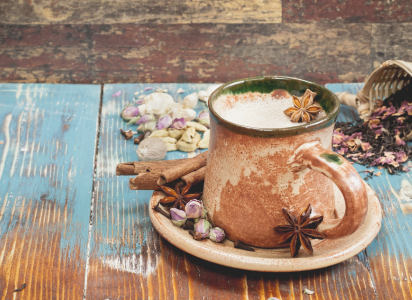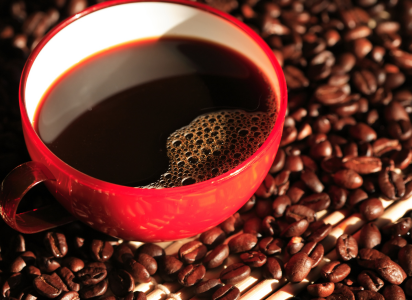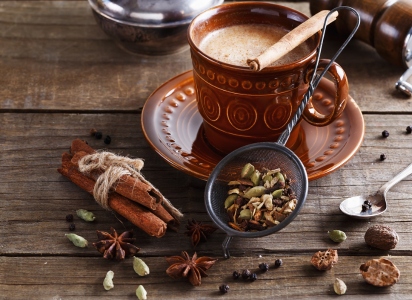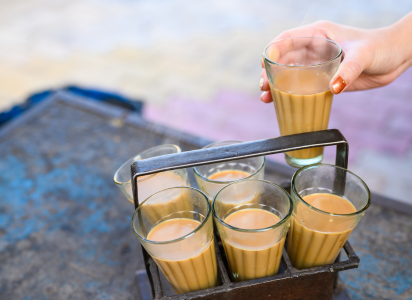It’s a debate as old as hot beverages themselves: Is chai tea really ‘coffee’, or are they completely different drinks with unique attributes? Understanding what sets each apart is key if you’re hoping to make an informed decision about which one is right for your palate!
So, Is Chai Coffee or Not?
As someone who spent her formal years in Pakistan, hearing people order “chai tea” drove me absolutely nuts!
The word “chai” literally translates to tea in Urdu and chai IS tea! But the way Pakistanis drink their tea is unique and if you stick around, I’ll share my recipe below.
What is Chai?

If you’re a fan of tea, chances are high that you’ve heard of chai. But what exactly is chai?
Well, this popular beverage originated in India and Pakistan and is typically made by brewing black tea with a blend of aromatic spices, such as cinnamon, cardamom, and ginger. The result is a deliciously spiced drink that is both comforting and flavorful.
Chai has gained popularity all over the world and can be enjoyed hot or cold, with or without milk and sweetener. If you haven’t tried it yet, it’s definitely worth a sip!
Thanks to Starbucks naming their drinks “chai tea latte” which translates to “tea tea latte” and also, latte is a coffee drink… so the word chai (technically) is being used in a false way. But now you know! And hopefully now you can understand why the names of these drinks drove me nuts!
What is Coffee?

Coffee is another yummalicious drink that people all over the world enjoy, with countless variations and methods of preparation. Whether you like it black, iced, or with a splash of milk, coffee is a versatile beverage that fits every mood and occasion.
But wait a minute, coffee isn’t just a tasty drink: it also has tons of health benefits, like boosting your energy, improving your cognitive function, and even reducing the risk of several diseases.
Now that you know that chai and coffee are two different drinks, let’s delve a bit deeper.
The Origin of Chai and Coffee

To be frank, the origin stories of chai and coffee are quite unique and fun.
In the 10th century in Ethiopia, legend has it that a shepherd noticed his goats became hyperactive after eating berries from a certain plant. The plant turned out to be coffee and it soon spread throughout the Arabian Peninsula and beyond. (Thank goodness!)
Chai, on the other hand, comes from India and/or Pakistan, where it was traditionally brewed with a mix of spices such as cinnamon, cardamom, and ginger. There are two theories as to how chai came to be and I’ll discuss both here.
The first theory is that the British brought their own tea to India in the 18th century and then Indians started to experiment with adding spices such as cardamom, cinnamon, and ginger.
The second theory is that chai comes from China as an ayuverdic-style herbal remedy and that Indian traders picked up the practice during their travels to China.
Even though we don’t know exactly how chai came to be, no matter which theory is true, chai has been a part of Indian and Pakistani cultures for centuries and there isn’t any surprise that it eventually made its way into pop culture all around the world!
In fact, I grew up drinking chai three times a day and used to make it for my parents so I’m going to give you the authentic recipe for a delicious, yummy mug of chai below. Drinking chai is part of the Pakistani and Indian cultures and without it, a meal isn’t considered complete!
How to Make the Most Perfect and Authentic Cup of Chai
While I’m about to give you my mom’s chai recipe below which is simple and to the point, below is a masterclass in a chai from the Chaiwala (“One who makes chai”) from Balochistan:
Chai is not just a beverage; it’s an artful experience. In fact, it’s super easy to make a fresh, authentic cup of chai within 10 minutes!
Start by boiling water in a pot and adding spices like cardamom, cinnamon, ginger, and cloves (basically, whatever you love). Keep in mind that the spices are a bonus, not a necessary part of chai.
Let the spices infuse in the boiling water for a few minutes before adding the tea leaves. Once the tea has brewed, please add regular milk according to your preference and let it simmer gently. If you prefer a non-dairy option, please make sure that it will remain okay for consumption if heated; if so, then use your non-dairy preference!
Strain the mixture into a cup and add sugar to your taste.
Enjoy the heavenly aroma and taste of this perfect cup of chai. Remember, the key is to balance the spices, tea, sugar, and milk in such a way that each flavor complements the other.
Each time you make chai, you’ll be able to refine the recipe until you create something you totally love.
Enjoy!
Is Chai Healthier than Coffee?

This is a fair question and as someone who recently suffered from ulcers, I had to take a big break from coffee and switch to tea. For certain people, chai is much healthier than coffee and here’s why.
While both drinks have their benefits, chai contains several ingredients that are known for their health-promoting properties. For instance, the blend of spices in chai (such as cinnamon, cardamom, and ginger) are believed to have anti-inflammatory effects and can provide a boost to your immune system.
Additionally, black tea (which is often used as the base for chai) contains less caffeine than coffee, which can be beneficial for those trying to cut back on stimulants.
Of course, as with anything, moderation is key. It’s important to be aware of added sugars in chai (which can negate some of the health benefits) and to make sure you’re not drinking too much caffeine, regardless of the source. All in all, if you’re looking to switch up your morning routine and want to try something new, chai is definitely a drink worth considering.
In Summary
Chai is definitely not coffee; chai is tea but with some added enhancements like milk and sugar (that’s the bare minimum recipe) that makes it so tasty and addictive. Chai and coffee are two completely separate drinks and are not to be confused as the same!